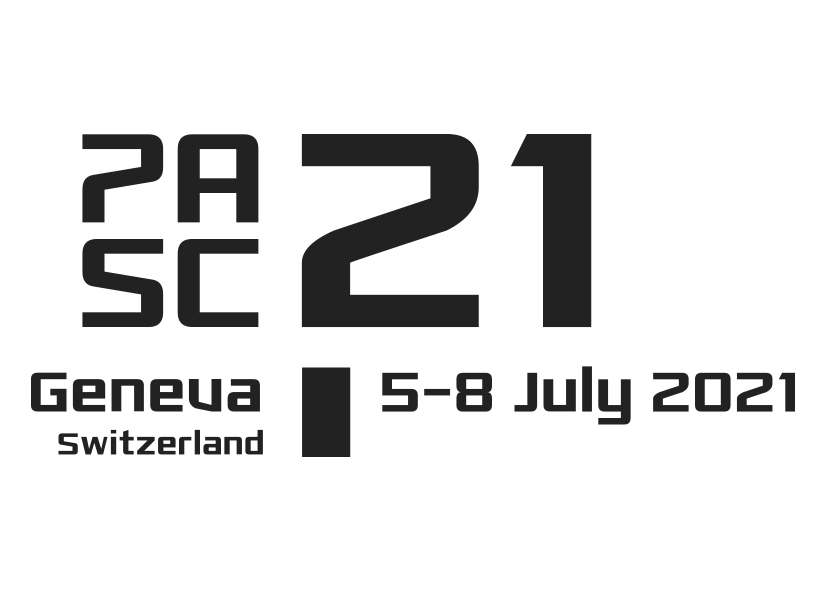On the road to PASC21 – submissions are open!
New dates for PASC21
We hope that you and your loved ones are safe and that you are managing well through this unprecedented time.
We are pleased to announce that preparations are well underway for the PASC21 Conference, which will combine content from the postponed PASC20 Conference together with new contributions. We are grateful to presenters who confirmed their participation in next year’s edition and invite you to peruse the program as it currently stands, which includes a number of minisymposia and papersfrom various scientific domains.
With the increase in content compared to previous years, we have decided to lengthen the conference to four days. We look forward to welcoming you in Geneva, Switzerland, from July 5 to 8, 2021.
PASC21 welcomes new paper and minisymposium submissions in a broad range of scientific disciplines: Chemistry and Materials, Life Sciences, Physics, Climate and Weather, Solid Earth Dynamics, Engineering, Computer Science and Applied Mathematics, and Emerging Application Domains.
Join computational scientists and HPC experts from all corners of the world to discuss methods, tools, algorithms, application challenges and novel techniques in HPC.
Call for papers
The goal of the PASC Conference Papers Program is to advance the quality of scientific communication between the various disciplines of computational science and engineering in the context of HPC. The program was built from an observation that the computer science community traditionally publishes in the proceedings of major international conferences, while domain science communities publish primarily in disciplinary journals – and neither of which is read regularly by the other. The PASC Conference provides a unique venue that enables interdisciplinary exchange in a manner that bridges the two scientific publishing cultures.
The technical program of PASC21 is organized around eight scientific domains:
- Chemistry and Materials
- Life Sciences (incl. but not limited to biophysics, genomics, bioinformatics, systems biology, neuroscience and computational biology, …)
- Physics (incl. but not limited to astrophysics, cosmology, plasma modelling, QCD, …)
- Climate and Weather
- Solid Earth Dynamics
- Engineering (incl. but not limited to CFD, computational mechanics, computational engineering materials, turbulent flow, …)
- Computer Science and Applied Mathematics
- Emerging Application Domains (incl. but not limited to social sciences, finance, …)
PASC21 solicits high-quality contributions of original research related to scientific computing in all of these domains.
Papers accepted for PASC21 are presented as talks and published by ACM in the Proceedings of the PASC Conference. In recognition of the high quality of the papers program, the ACM provides the proceedings as an OpenTOC without any pay-wall constraints. Papers of particular merit, especially those with strong interdisciplinary impact, may be given the opportunity of a plenary presentation. Additional opportunities exist for publishing extended papers with partner journals.
Deadline: 13 December 2020 (NO EXTENSIONS!)
For additional information, please refer to pasc21.pasc-conference.org/submission/guidelines-for-papers/.
Papers Program Committee
The Papers Program Committee for PASC21 is co-chaired by Kate Evans (Oak Ridge National Laboratory, US) and Damian Rouson (Sourcery Institute, US). We are grateful to all domain chairs, committee members and external reviewers for their support.
Domain Chairs
Stephan Irle (Chemistry and Materials; Oak Ridge National Laboratory, US)
Clemence Corminboeuf (Chemistry and Materials; EPFL, Switzerland)
Anotida Madzvamuse (Life Sciences; University of Sussex, UK)
Suzanne Lenhart (Life Sciences; University of Tennessee, US)
Katrin Heitmann (Physics; Argonne National Laboratory, US)
Axel Huebl (Physics; Lawrence Berkeley National Laboratory, US)
Oliver Fuhrer (Climate and Weather; Vulcan Inc., US)
Samantha Adams (Climate and Weather; Met Office, UK)
Monica Maceira (Solid Earth Dynamics; Oak Ridge National Laboratory, US)
Andreas Fichtner (Solid Earth Dynamics; ETH Zurich, Switzerland)
Alvaro Coutinho (Engineering; Federal University of Rio de Janeiro, Brazil)
Rachel Slaybaugh (Engineering; UC Berkeley, US)
Laura Grigori (Computer Science and Applied Mathematics; INRIA Paris, France)
Sameer Shende (Computer Science and Applied Mathematics; University of Oregon, US)
Yan Liu (Emerging Application Domains; Oak Ridge National Laboratory, US)
WenWen Li (Emerging Application Domains; Arizona State University, US)
A full list of committee members is available at pasc21.pasc-conference.org/about/papers-program-committee/.
Call for minisymposia
Minisymposium sessions are an ideal platform for promoting interdisciplinary communication. A minisymposium is a two-hour session of four 30-minute presentation slots (or three presentations and an open discussion) on a topic of significant interest to the given scientific domain, ideally having potential application in other domains. Organizers should ensure that their proposed speakers bring a range of different perspectives to the topic and come from multiple institutions and countries; organizers are required to comment on diversity and inclusivity in their proposals.
Although we welcome proposals in any of the eight PASC scientific domains, preference may be given to the following domains in order to provide for overall program balance:
- Chemistry and Materials
- Life Sciences
- Solid Earth Dynamics
- Emerging Application Domains (e.g. urban planning, mobility, disaster response, …)
For additional information, please refer to pasc21.pasc-conference.org/submission/guidelines-for-minisymposia/.
Expression of Interest (EOI) deadline: 22 November 2020; Full submission (if invited after EOI notification): 17 January 2021.
Minisymposia and Posters Program Committee
The Minisymposia and Posters Program Committee for PASC21 is co-chaired by Bastien Chopard(University of Geneva, Switzerland) and Sinéad Ryan (Trinity College Dublin, Ireland). We are grateful to all domain chairs and committee members for helping shape the minisymposia program.
Domain Chairs
David Benoit (Chemistry and Materials; University of Hull, UK)
Silvana Botti (Chemistry and Materials; Friedrich-Schiller Universität Jena, Germany)
Jean-Philip Piquemal (Life Sciences; Sorbonne University, France)
Amanda Randles (Life Sciences; Duke University, US)
Roger Käppeli (Physics; ETH Zurich, Switzerland)
Marina Krstic Marinkovic (Physics; ETH Zurich, Switzerland)
Joachim Biercamp (Climate and Weather; German Climate Computing Center, Germany)
Zhenya Song (Climate and Weather; State Oceanic Administration, China)
Alice Gabriel (Solid Earth Dynamics; Ludwig Maximilian University of Munich, Germany)
Chun Liu (Solid Earth Dynamics; Nanjing University, China)
Ramesh Balakrishnan (Engineering; Argonne National Laboratory, US)
Karlene Maskaly (Engineering; Lawrence Livermore National Laboratory, US)
Xiaoye Sherry Li (Computer Science and Applied Mathematics; Lawrence Berkeley National Laboratory, US)
Stefan Wild (Computer Science and Applied Mathematics; Argonne National Laboratory, US)
Andrea Gabrielli (Emerging Application Domains; Istituto dei Sistemi Complessi, Italy)
Philipp Eisenhauer (Emerging Application Domains; University of Bonn, Germany)
A full list of committee members is available at pasc21.pasc-conference.org/about/minisymposia-and-posters-program-committee/.
COVID-19
We are closely monitoring the Coronavirus developments in Switzerland and around the world, and we are coordinating efforts with the University of Geneva to ensure that all health regulations are met in view of creating a safe and relaxing environment for attendees. In case the situation appears to compromise the hosting of the in-person conference, we will consider other event formats and forms of participation. A coronavirus advisory is available on the conference website at the followingpage.


